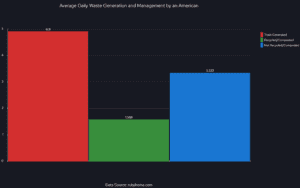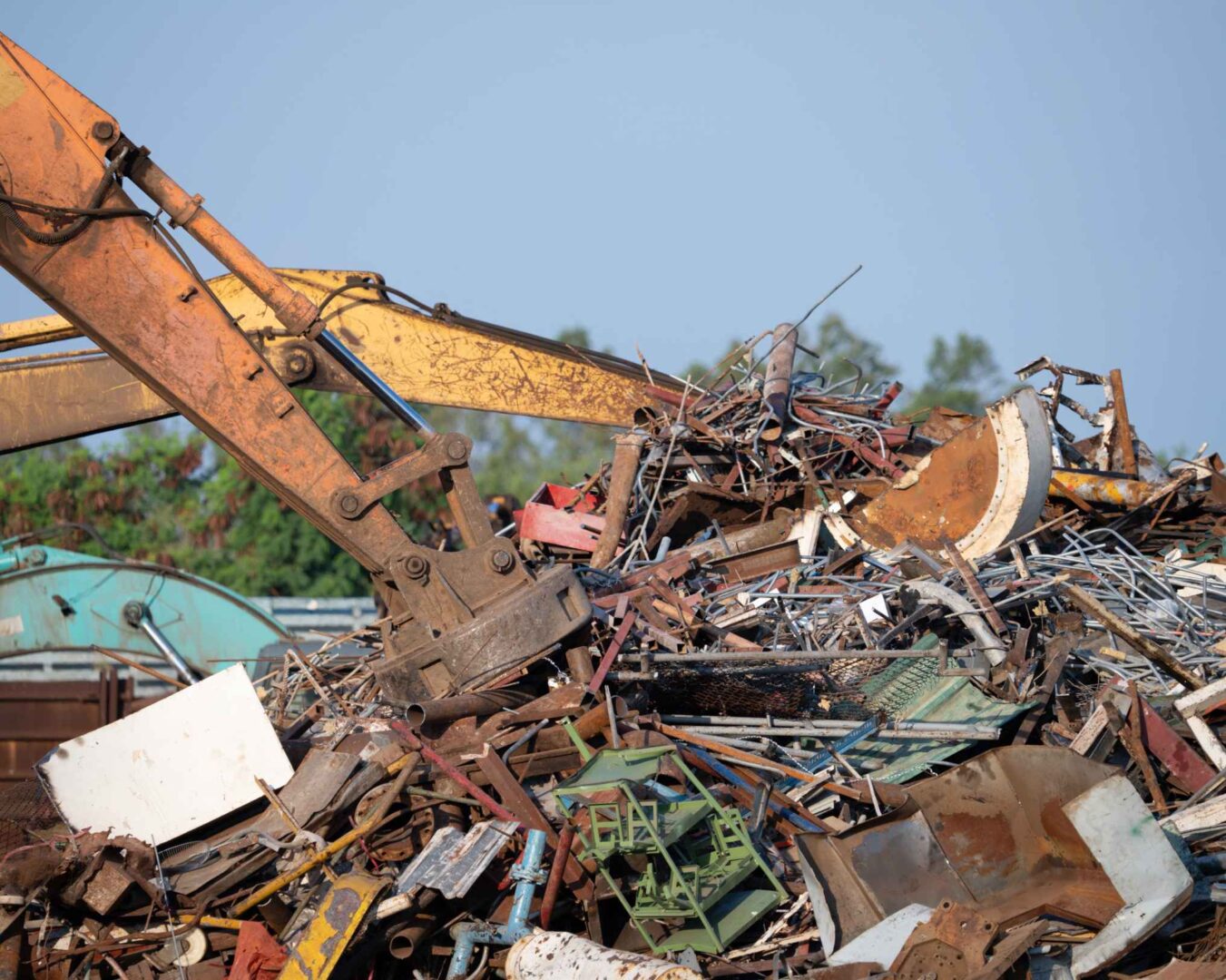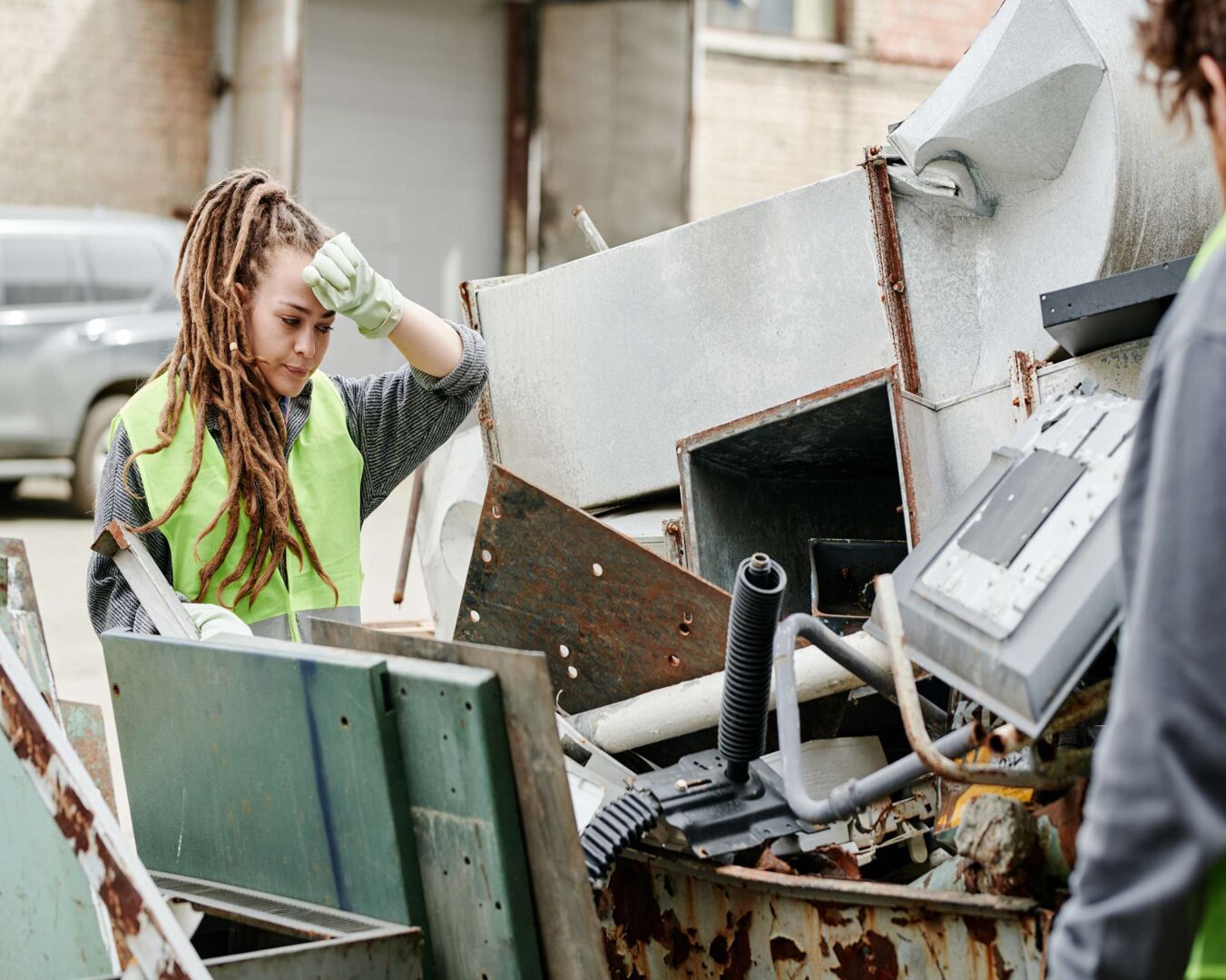A world where the circular economy is reshaping traditional business models, beneficial reuse stands out as a beacon of sustainability and modern industrial innovation.
Recent report by Harriswilliams.com from March 2023 highlights the emergence of beneficial reuse and the circular economy as pivotal frameworks in modern waste management, signaling a transformative shift in our approach to waste and resources.
Imagine a world where the average American generates 4.9 pounds of trash per day, with only 32% of waste being recycled or composted. This is not a dystopian future but our current reality, as highlighted by rubyhome.com.
In this scenario, the role of beneficial reuse becomes crucial, serving as a gateway to sustainability and waste reduction in modern industries.
Beneficial Reuse Service is redefining the paradigms of waste management, presenting businesses with an eco-friendly alternative to manage excess or unwanted products.
This service is not just about waste reduction, it’s about transforming discarded materials into meaningful opportunities, creating a ripple effect of positive change in local communities and the environment.
Table of Contents
Understanding the Essence: What is Beneficial Reuse?
Beneficial Reuse is a concept endorsed by the Environmental Protection Agency (EPA), focusing on the optimal utilization of waste materials on a commercial scale. It’s about viewing waste not as discarded material but as a valuable resource, capable of serving purposes beyond its intended use.
A Paradigm Shift in Waste Management
- Beneficial Reuse is not recycling, it’s about giving waste a second life, redirecting it to serve meaningful purposes.
- It’s a step towards a circular economy where resources are optimized, waste is minimized, and environmental impacts are significantly reduced.
- This approach is a testament to the transformative power of innovation in waste management, turning problems into solutions and waste into wealth.
The Evolution of Beneficial Reuse Services
Beneficial reuse services have evolved significantly, offering comprehensive solutions to various industries. These services focus on repurposing waste materials, ensuring they are utilized efficiently and responsibly.
A report on E-waste Recycling and Reuse Services Market for 2023-2030 highlights the growing trend in the industry, emphasizing the increasing adoption of such services globally.
The services are not just limited to e-waste but extend to various other waste materials, providing an eco-friendly alternative to traditional waste disposal methods.
The Impact of Beneficial Reuse Companies
Beneficial reuse companies are playing a pivotal role in promoting sustainability and reducing environmental degradation. They are not just service providers but are contributors to a global movement towards a more sustainable and equitable world.
These companies are innovating and implementing strategies to repurpose waste materials, offering solutions that are both environmentally and economically beneficial.
Clarifying Concepts: Beneficial Reuse Definition
Beneficial Reuse is the process of reusing or repurposing waste materials, preventing them from becoming waste in the first place. It’s about extracting commodity value from what is conventionally considered waste, emphasizing waste prevention over waste management.
Beneficial Reuse goes beyond conventional definitions of waste management. It’s not about disposal or recycling, it’s about viewing waste as a resource, a valuable commodity with untapped potential. It’s about a strategic approach to waste, one that prioritizes prevention and reuse over disposal and recycling.
The Role of Beneficial Reuse Consultants
Beneficial reuse consultants are the architects of waste transformation. They analyze waste streams, develop strategies for waste repurposing, and ensure the implementation of sustainable practices.
Their expertise is crucial in navigating the complexities of waste management and in designing solutions that are tailored to the specific needs of businesses and communities.
Waste Beneficial Reuse Solutions
Waste beneficial reuse solutions are designed to address the multifaceted challenges of waste management. They offer a sustainable alternative to conventional disposal methods, focusing on the repurposing of waste materials. These solutions are instrumental in reducing environmental pollution, conserving natural resources, and promoting economic sustainability.
Diving Deeper: What is the Beneficial Reuse of Waste Materials?
Beneficial Reuse of waste materials involves the innovative repurposing of items such as old clothing, containers, and other traditionally discarded materials. It’s about transforming these items, giving them a new purpose, and contributing to sustainability.
The Transformation Journey
- Old clothing can find new owners, reducing the demand for new garments and mitigating the environmental impacts of clothing production.
- Containers, often discarded after single use, can be repurposed, reducing the need for new production and mitigating the environmental footprint.
- Every item that is beneficially reused is a step towards a sustainable future, a contribution to reducing waste and preserving our planet.
The concept of Beneficial Reuse is gaining traction as a pivotal component of the circular economy, a modern economic framework aimed at minimizing waste and optimizing resources.
Beneficial Reuse of Solid Waste: A Path to Sustainability
Beneficial reuse of solid waste is a critical component of sustainable waste management. It involves the conversion of solid waste materials into useful products, reducing the reliance on landfills and contributing to environmental conservation. This approach is gaining momentum, with more industries recognizing its potential in achieving sustainability goals.
Beneficial Reuse of Hazardous Waste: Managing Risks
Beneficial reuse of hazardous waste is a complex but essential aspect of waste management. It involves stringent procedures to ensure the safe and responsible handling of hazardous materials. The process is meticulously designed to mitigate risks and prevent any adverse impact on human health and the environment.
Weighing the Scales: What are the Advantages and Disadvantages of Reuse?
The advantages of reuse are manifold, including reduced costs, preservation of natural resources, reduced pollution, and decreased greenhouse gas emissions. Reusing items not only mitigates the environmental impacts but also contributes to economic sustainability and efficient resource management.
The Impact of Reuse
- Reuse significantly reduces the demand for new production, conserving natural resources and energy.
- It mitigates pollution and greenhouse gas emissions associated with the production and disposal of goods.
- Economically, reuse is a cost-efficient approach to waste management, reducing expenses related to disposal and new production.
Reusing materials has several advantages, including reduced costs, preservation of natural resources, and decreased pollution. However, it also comes with its set of challenges, such as the potential risk of contamination and the need for stringent quality controls.
Beneficial Reuse Management Company: A Catalyst for Change
A beneficial reuse management company serves as a catalyst for change in the waste management sector. It provides strategic solutions for the repurposing of waste materials, driving innovation and sustainability. These companies are at the forefront of creating a circular economy, where waste is viewed as a resource rather than a burden.
The Triple Win: What are the 3 Benefits of Reducing and Reusing?
Reducing and reusing materials offer three major benefits: the opportunity to buy used items, the chance to donate unused items, and the avoided use of landfill space. These practices are not just environmentally beneficial but also economically advantageous, fostering a sustainable lifestyle.
The Three Pillars of Sustainability
- Buying used items reduces demand for new production, conserving resources and energy.
- Donating unused items supports local communities and charitable organizations, promoting social responsibility.
- Avoiding the use of landfill space mitigates environmental degradation and preserves ecological balance.
Plastic’s Second Chance: What are the Benefits of Reusing Plastic?
Reusing plastic contributes to reduced waste, emission reduction, and sustainable management of industrial non-hazardous secondary materials. It’s about giving plastic a second chance, mitigating its environmental impacts, and promoting responsible consumption and production.
The Potential of Plastic Reuse
- Reusing plastic mitigates the environmental impacts associated with plastic production and disposal.
- It contributes to emission reduction, mitigating the release of greenhouse gases and pollutants.
- Sustainable management of plastic promotes responsible consumption and production, fostering environmental stewardship.
Prosperity through Sustainability: What are the Economic Benefits of Reusing Waste?
Reusing waste is not just an environmental endeavor but also an economic catalyst. It fosters economic sustainability and cost efficiency, turning waste into wealth and optimizing resource management. It’s about leveraging waste as an economic asset, creating value and opportunities out of discarded materials.
Economic Insights into Waste Reuse
- Economic sustainability is achieved when waste is viewed and utilized as a valuable resource, contributing to long-term economic stability and prosperity.
- Cost efficiency in waste management is realized through reuse, reducing expenses related to waste disposal and mitigating the economic impacts of resource depletion.
- Resource management is optimized when waste is reused, ensuring the sustainable utilization of available resources and mitigating the risks of resource scarcity.
Choosing Wisely: What Items Should We Reuse?
Choosing the right items to reuse is crucial. Old clothing, electronics, building materials, and containers are prime candidates for reuse. These items, when reused, can significantly reduce environmental impacts and contribute to sustainability.
The Wise Choices for Reuse
-
People can repurpose or donate old clothing, which reduces the demand for new clothing production and lessens the environmental impacts of textile manufacturing. According to careelite.de, people in Germany reuse about 62 percent of used textiles as second-hand clothing. They process approximately 14 percent into low-value products.
- Electronics, when reused or refurbished, can extend the lifecycle of electronic products, mitigating e-waste and conserving valuable resources.
- Building materials can be reused in construction projects, reducing the demand for new materials and promoting sustainable construction practices.
Practical Altruism: How Can We Reuse Waste?
Reusing waste is about practical altruism. It involves waste repurposing, waste reutilization, sustainable waste management, and waste transformation. It’s about turning waste into opportunities, contributing to societal well-being and environmental conservation.
The Altruistic Approach to Waste Reuse
- Waste repurposing is about finding new uses for discarded materials, contributing to resource conservation and waste reduction.
- Waste reutilization involves the use of waste materials in their original form, extending the lifecycle of products and mitigating waste generation.
- Sustainable waste management is achieved through responsible waste handling, promoting environmental stewardship and sustainability.
From Waste to Wealth: How Can We Reuse Food Waste?
Food waste, when reused, can be transformed into wealth. Through sustainable food practices and waste-to-wealth initiatives, food repurposing becomes a viable solution to food waste problems, contributing to food security and environmental conservation.
The Wealth in Food Waste
- Food waste management involves responsible handling of food waste, mitigating its environmental impacts and contributing to food security.
- Sustainable food practices promote the responsible consumption and production of food, mitigating food waste and fostering sustainability.
- Waste-to-wealth initiatives involve the transformation of food waste into valuable products, creating economic opportunities and promoting sustainability.
Hazardous Endeavors: How Can We Reuse Hazardous Waste and What is the Best Way to Reduce It?
Hazardous waste poses significant risks to human health and the environment. However, through beneficial reuse, solid by-products can be managed responsibly, and sanitary landfills can be optimized, mitigating the risks associated with hazardous waste.
The Responsible Management of Hazardous Waste
- Solid waste, when managed responsibly, can be reused or repurposed, mitigating the environmental impacts associated with waste disposal.
- Beneficial reuse of solid by-products involves the transformation of waste materials into valuable resources, contributing to environmental conservation and economic sustainability.
- Sanitary landfills, when optimized, can mitigate the risks of environmental degradation and human health impacts associated with hazardous waste disposal.
Green Workplace: How Can We Reuse Waste in the Workplace?
A green workplace is achieved through workplace sustainability, green office practices, sustainable workplace initiatives, and office waste management. It’s about creating a work environment that is in harmony with nature, promoting sustainability and environmental stewardship.
The Greening of the Workplace
- Workplace sustainability involves the adoption of sustainable practices in the workplace, promoting environmental conservation and responsible resource utilization.
- Green office practices include the implementation of eco-friendly office solutions, reducing the environmental footprint of office operations.
- Sustainable workplace initiatives involve the integration of sustainability principles into workplace policies and practices, fostering a culture of environmental responsibility.
A New Perspective on Waste: Beneficial Reuse Waste Management
Beneficial Reuse Waste Management is about changing our perspective on waste. It’s about adopting waste management practices that see waste as a resource rather than a burden, practices that are sustainable and beneficial.
Changing the Narrative on Waste
- Adopting a new perspective on waste involves seeing the potential in discarded materials, recognizing their value and utility.
- Sustainable waste practices are about responsible waste management, ensuring that waste is handled, processed, and disposed of in an environmentally friendly manner.
- Beneficial waste management is about leveraging waste as a resource, transforming it into valuable products and contributing to economic and environmental sustainability.
The Rise of Beneficial Reuse Services in 2023
In 2023, the emphasis on sustainability and eco-friendly practices has led to a surge in the demand for beneficial reuse services. Businesses are increasingly recognizing the value of turning waste into wealth.
According to a recent report from the Plant Based World Expo, there’s a growing trend towards sustainable living and dietary choices, which aligns with the principles of beneficial reuse. This shift in perspective is not just about managing waste but about transforming it into meaningful opportunities.
Leading Beneficial Reuse Companies in 2023
The landscape of beneficial reuse companies has evolved. The leading beneficial reuse company is Happen Ventures that is pioneering this change. However, several other companies have emerged, offering innovative solutions to waste management challenges.
These companies are not just focused on waste reduction but are actively involved in repurposing waste, ensuring that it finds a new life and purpose.
Strategic Sustainability: Beneficial Reuse Management
Beneficial Reuse Management is about strategic sustainability. It’s about adopting sustainable strategies and beneficial management practices that are not only environmentally friendly but also economically viable.
The Strategy Behind Sustainability
- Strategic waste management involves the adoption of waste management practices that are sustainable, efficient, and economically viable.
- Sustainable strategies are about long-term sustainability, ensuring that the adopted practices are environmentally friendly and economically beneficial.
- Beneficial management practices involve the optimal utilization of resources, maximizing value and minimizing waste.
Beneficial Reuse Consultants: Guiding the Way
As the demand for beneficial reuse solutions grows, there’s an increasing need for expert guidance. Beneficial reuse consultants have become invaluable assets for businesses looking to adopt these practices.
They offer insights, strategies, and expertise, ensuring that businesses can navigate the complexities of waste management effectively.
The Evolution of the Beneficial Reuse Management Company
2023 has seen the rise of the beneficial reuse management company. These companies are at the forefront of waste management innovation, offering tailored solutions that align with the specific needs of businesses.
They are not just focused on waste reduction but are actively involved in repurposing waste, ensuring that it finds a new life and purpose.
Innovative Approaches: Solid Waste Beneficial Reuse Solutions
Solid Waste Beneficial Reuse Solutions are about innovative approaches to waste management. It’s about reusing, recycling, and reclaiming waste, mitigating environmental hazards, and conserving natural resources.
Pioneering Waste Solutions
- Innovative approaches to waste management involve the adoption of new technologies and practices that optimize waste handling and processing.
- Reusing and recycling waste are pivotal components of solid waste beneficial reuse solutions, contributing to resource conservation and waste reduction.
- Reclaiming waste involves the transformation of waste materials into valuable resources, mitigating environmental impacts and promoting sustainability.
Addressing the Challenge of Hazardous Waste
Beneficial reuse of hazardous waste has become a critical area of focus in 2023. Traditional methods of disposal posed significant environmental risks.
However, with the advent of innovative technologies and practices, hazardous waste is now being repurposed in ways that are safe and environmentally friendly.
Landfill Operations and Management
The traditional approach to landfill operations and management is undergoing a transformation. The emphasis is now on beneficial reuse solutions for landfill operations and management.
Instead of merely dumping waste, landfills are becoming centers of innovation, where waste is repurposed and transformed into valuable resources.
The Final Call
In a world where the repercussions of waste are becoming increasingly evident, the role of Beneficial Reuse becomes paramount. It’s not just about managing waste, it’s about transforming it, giving it a new purpose, a new life.
Happen Ventures, with its Beneficial Reuse Service, is leading this transformation, presenting a viable, sustainable, and beneficial alternative to traditional waste management practices.
Through Beneficial Reuse, we are not just saving the environment, we are also creating opportunities, fostering economic sustainability, and building stronger, more resilient communities. It’s about creating a world where waste is not a problem but a solution, a world where sustainability is not just a goal but a way of life.





